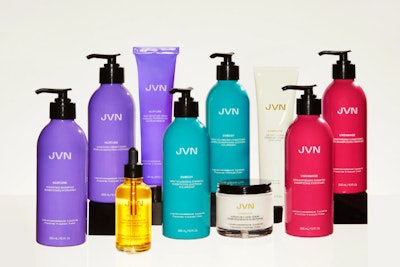JVN
Results-driven hair care for all hair types

JVN's Sustainability Rating
Acceptable
Ingredients
JVN has made ingredient commitments to lower its environmental impact, including by avoiding certain petrochemical-based ingredients. While it has made commitments, it still use some ingredients that pose a significant threat to the climate, including uncertified palm oil or palm oil-derived ingredients, other petrochemical-based ingredients and other harmful ingredients. It can be very difficult to eliminate these entirely, especially for small brands with limited resources. Its products incorprate bio-based ingredients. It carries products that have certifications from Leaping Bunny and Clean + Planet Aware. JVN holds the following company-level certifications: 1% for the Planet and Carbonfund.
Containers & Packaging
JVN hasn't made any efforts to concentrate its products or minimize its containers, which increases shipping emissions and packaging volumes. Its working to reduce shipping emissions by prioritizing ocean freight over air freight. It uses eco-friendly materials in its product containers, using glass and aluminium containers. Its shipping packaging materials includes ones that are FSC-certified and recyclable.
Energy & Water Use
JVN doesn't share information on its energy strategy, beyond noting that some of its production energy somes from co-generation. JVN doesn't provide information on any water conservation strategies. JVN has a global production span, which is standard for the industry.
Refill & Reuse
JVN doesn't utilize any alternative models or methods to avert waste.
Slow Cleaning
JVN doesn't frequently release seasonal or limited edition products, which helps prevent production of excess inventory.
Marketing
Commons is still evaluating this brand's marketing emails.
Transparency & Reporting
JVN has a prominent sustainability page with comprehensive details on its climate strategy. Like many small brands with limited resources, it doesn't publish an annual sustainability report. JVN shares a complete list of ingredients used in its products, on a per product basis. The brand shares an ingredient glossary that doesn't include all ingredients and may be misleading to consumers.
Emissions Tracking
Commons couldn't find information on this brand's emissions tracking.
Targets & Offsets
Commons couldn't find emissions reduction targets for this brand. The brand offsets emissions from its shipping through Carbonfund.
Supply Chain & Labor
JVN publishes limited information about its supply chain partners It doesn't publicly share a supplier code of conduct. JVN doesn't have a stated policy of regularly auditing its supply chain partners. This may increase human and environmental risks.
Advocacy
Commons wasn't able to find evidence of any trade association memberships or any relevant policy for this brand. JVN isn't a member of any key advocacy organizations that are blocking climate policy. It isn't a member of advocacy organizations advancing climate policy. It doesn't employ any state lobbyists. JVN didn't donate more than $100k to climate-obstructive candidates or PACs from 2018-2024.
JVN is rated Acceptable because it has started to improve its products and packaging, but still has room to grow.
While it avoids select ingredients, it still uses some that pose a significant threat to the climate, including uncertified palm oil or palm oil-derived ingredients, other petrochemical-based ingredients, and hydrofluorocarbon, a potent greenhouse gas. JVN doesn't utilize any alternative models or packaging minimization strategies to reduce its waste and emissions footprint. However, it uses glass and aluminium product containers with pumps made from PCR plastic to help reduce its packaging footprint.
JVN doesn't provide information on any emissions reduction targets, but it offsets the carbon emissions from its shipping. We hope to see it provide more information on its energy and emissions reduction strategies in the future.
Our ratings are based on a scale from 1 (bad) to 5 (best). How we rate →
https://jvnhair.com/pages/about
https://jvnhair.com/pages/faqs?srsltid=AfmBOopVVmu5OUTWepBdlxC8bwxDpNj0c7iyaMy829byGi9YfYcUm-_f#:~:text=Two%20of%20the%20ingredients%20we
https://jvnhair.com/pages/help-center?hcUrl=%2Fen-US%23article-1405031
https://jvnhair.com/pages/sustainability
https://jvnhair.com/pages/help-center?hcUrl=%2Fen-US%23article-1404948
https://jvnhair.com/pages/help-center?hcUrl=%2Fen-US%23article-1404927
https://jvnhair.com/pages/help-center?hcUrl=%2Fen-US%23article-1404949
https://jvnhair.com
https://jvnhair.com/pages/ingredients-library?page_82aa97ac=1
https://fminus.org/lobbyists/
https://www.fec.gov/data/browse-data/
Get Rewards
Earn for sustainable purchases
Commons rewards you for sustainable purchases from all our Top Rated brands, plus thousands of everyday purchases — from thrift stores to public transit.
Learn more about rewards ->



